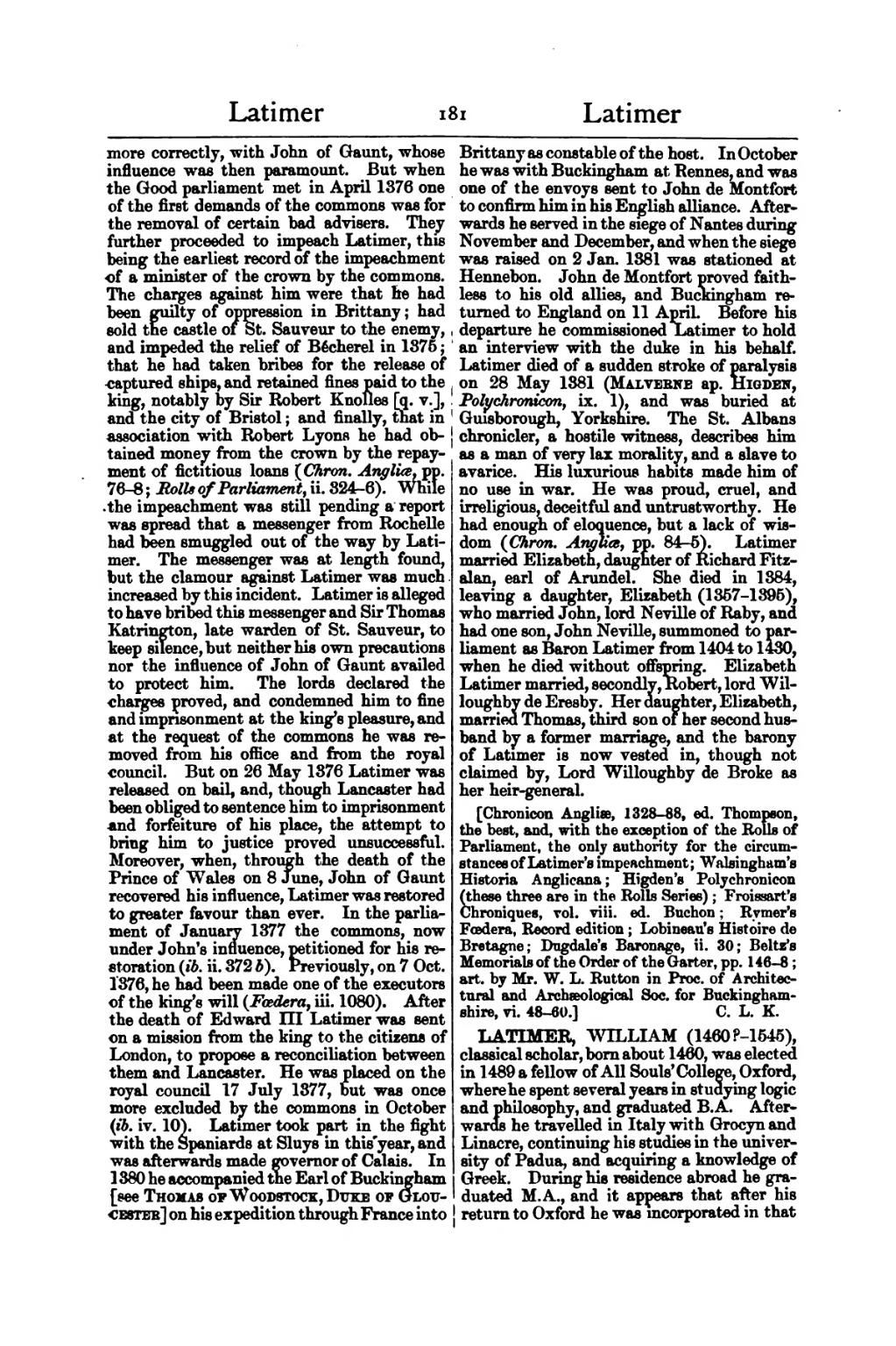more correctly, with John of Gaunt, whose influence was then paramount. But when the Good parliament met in April 1376 one of the first demands of the commons was for the removal of certain bad advisers. They further proceeded to impeach Latimer, this being the earliest record of the impeachment of a minister of the crown by the commons. The charges against him were that he had been guilty of oppression in Brittany; had sold the castle of St. Sauveur to the enemy, and impeded the relief of Bécherel in 1375; that he had taken bribes for the release of captured ships, and retained fines paid to the king, notably by Sir Robert Knolles [q.v.], and the city of Bristol; and finally, that in association with Robert Lyons he had obtained money from the crown by the repayment of fictitious loans (Chron. Angliæ, pp. 76–8; Rolls of Parliament, ii. 324–6). While the impeachment was still pending a report was spread that a messenger from Rochelle had been smuggled out of the way by Latimer. The messenger was at length found, but the clamour against Latimer was much increased by this incident. Latimer is alleged to have bribed this messenger and Sir Thomas Katrington, late warden of St. Sauveur, to keep silence, but neither his own precautions nor the influence of John of Gaunt availed to protect him. The lords declared the charges proved, and condemned him to fine and imprisonment at the king's pleasure, and at the request of the commons he was removed from his office and from the royal council. But on 28 May 1376 Latimer was released on bail, and, though Lancaster had been obliged to sentence him to imprisonment and forfeiture of his place, the attempt to bring him to justice proved unsuccessful. Moreover, when, through the death of the Prince of Wales on 8 June, John of Gaunt recovered his influence, Latimer was restored to greater favour than ever. In the parliament of January 1377 the commons, now under John's influence, petitioned for his restoration (ib. ii. 372 b). Previously, on 7 Oct. 1376, he had been made one of the executors of the king's will (Fœdera, iii. 1080). After the death of Edward III Latimer was sent on a mission from the king to the citizens of London, to propose a reconciliation between them and Lancaster. He was placed on the royal council 17 July 1377, but was once more excluded by the commons in October (ib. iv. 10). Latimer took part in the fight with the Spaniards at Sluys in this year, and was afterwards made governor of Calais. In 1380 he accompanied the Earl of Buckingham [see Thomas of Woodstock, Duke of Gloucester] on his expedition through France into Brittany as constable of the host. In October he was with Buckingham at Rennes, and was one of the envoys sent to John de Montfort to confirm him in his English alliance. Afterwards he served in the siege of Nantes during November and December, and when the siege was raised on 2 Jan. 1381 was stationed at Hennebon. John de Montfort proved faithless to his old allies, and Buckingham returned to England on 11 April. Before his departure he commissioned Latimer to hold an interview with the duke in his behalf. Latimer died of a sudden stroke of paralysis on 28 May 1381 (Malverne ap. Higden, Polychronicon, ix. 1), and was buried at Guisborough, Yorkshire. The St. Albans chronicler, a hostile witness, describes him as a man of very lax morality, and a slave to avarice. His luxurious habits made him of no use in war. He was proud, cruel, and irreligious, deceitful and untrustworthy. He had enough of eloquence, but a lack of wisdom (Chron. Angliæ, pp. 84–5). Latimer married Elizabeth, daughter of Richard Fitzalan, earl of Arundel. She died in 1384, leaving a daughter, Elizabeth (1357–1395), who married John, lord Neville of Raby, and had one son, John Neville, summoned to parliament as Baron Latimer from 1404 to 1430, when he died without offspring. Elizabeth Latimer married, secondly, Robert, lord Willoughby de Eresby. Her daughter, Elizabeth, married Thomas, third son of her second husband by a former marriage, and the barony of Latimer is now vested in, though not claimed by, Lord Willoughby de Broke as her heir-general.
[Chronicon Angliæ, 1328–88, ed. Thompson, the best, and, with the exception of the Rolls of Parliament, the only authority for the circumstances of Latimer's impeachment; Walsingham's Historia Anglicana; Higden's Polychronicon (these three are in the Rolls Series); Froissart's Chroniques, vol. viii. ed. Buchon; Rymer's Fœdera, Record edition; Lobineau's Histoire de Bretagne; Dugdale's Baronage, ii. 30; Beltz's Memorials of the Order of the Garter, pp. 146–8; art. by Mr. W. L. Rutton in Proc. of Architectural and Archæological Soc. for Buckinghamshire, vi. 48–60.]
LATIMER, WILLIAM (1460?–1545), classical scholar, born about 1460, was elected in 1489 a fellow of All Souls' College, Oxford, where he spent several years in studying logic and philosophy, and graduated B.A. Afterwards he travelled in Italy with Grocyn and Linacre, continuing his studies in the university of Padua, and acquiring a knowledge of Greek. During his residence abroad he graduated M.A., and it appears that after his return to Oxford he was incorporated in that
